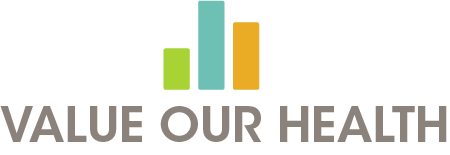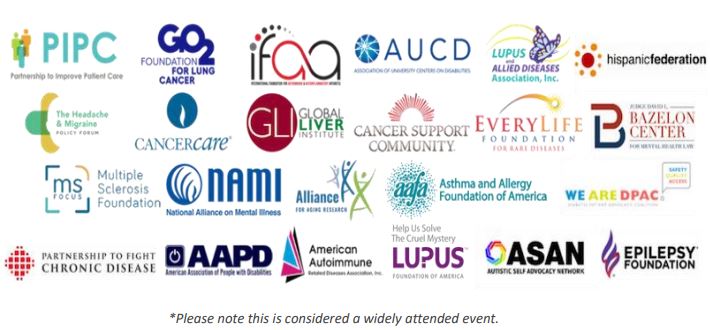On June 20, 2019, the Partnership to Improve Patient Care hosted two Capitol Hill briefings to introduce Value Our Health, a group of patient and disability organizations that have come together to champion patient-centric value assessments.
The briefing featured Sara van Geertruyden, Executive Director, Partnership to Improve Patient Care; Ari Ne’eman, Disability Advocate, Partnership to Improve Patient Care; Rachel Patterson, Health Task Force Co-chair, Consortium for Citizens with Disabilities (CCD) and Senior Director, Government Relations and Advocacy Epilepsy Foundation; and Elizabeth Franklin, Executive Director, Cancer Policy Institute, Cancer Support Community.
The panelists shared their concern about current value assessments, like those conducted by the Institute for Clinical and Economic Review (ICER), because the metrics they use, like the quality-adjusted life year (QALY) and equal value life-year gained (evLYG), treat patients as averages. Mr. Ne’eman explained that the QALY is a tool used in therapeutic value assessment. “It is designed to reduce the many different people and things that people seek from health care — improvement in quality of life, life extension — to a single number.” Insurers, researchers, and governments around the globe use the QALY to assess the benefit of different health interventions, often leading to people with disabilities being left out in the cold. For example, said Mr. Ne’eman, under one QALY measure, one “year in a life with moderate multiple sclerosis is worth 54 percent of the year in the life of a hypothetical non-disabled person.”
Ms. Patterson underscored the widespread consensus among the largest coalition of disability organizations (CCD) opposing the use of Quality Adjusted Life Years (QALYs) and related measures and supporting an explicit ban on the use of QALYs in any health care legislation that considers the value or effectiveness of treatments or health care. She emphasized that the QALY is a discriminatory measure based on the idea that disabled lives are less valuable and less worth living than non-disabled lives.
Ms. Franklin explained that based on a recent public opinion survey conducted by Cancer Support Community, after having the QALY explained to them, 85% of participants had a negative view of the QALY and were concerned it could be used to keep patients from accessing treatments they need.
Despite concerns from the patient and disability communities and negative public opinion about this type of value assessment, policymakers continue to look towards cost-effectiveness as a lever to lower drug pricing. Ms. van Geertruyden explained that several states are looking to use cost-effectiveness to limit their formularies, and it is being debated at the federal level through proposals like binding arbitration. She cautioned that other countries that have gone this route have seen severely limited patient access and resulting worse outcomes, sharing that for breast, colon, lung, and prostate cancers, 5-year survival rates are higher in U.S. than those in Canada, France, Germany, Italy, Japan, and the U.K.
Ms. van Geertruyden explained that patients are looking for value assessment tools that do not discriminate against them, but instead put them in the driver’s seat. To illustrate this, Value Our Health, developed their own principles for patient-centric value assessments. These principles indicate that value assessments should: Acknowledge diversity and differences among patients, not be misused by payers and policymakers to limit patient access, be developed using transparent processes and methods, meaningfully engage with patients and providers, rely on a range of patient-centric evidence, address cost and benefits that matter to patients, and produce evidence on the value of treatments based on patient-centered outcomes.
As policymakers entertain policies to lower healthcare costs, Value Our Health hopes they will not allow patients to become collateral damage of a one-size-fits-all health system by misusing discriminatory forms of value assessment.
The briefing featured Sara van Geertruyden, Executive Director, Partnership to Improve Patient Care; Ari Ne’eman, Disability Advocate, Partnership to Improve Patient Care; Rachel Patterson, Health Task Force Co-chair, Consortium for Citizens with Disabilities (CCD) and Senior Director, Government Relations and Advocacy Epilepsy Foundation; and Elizabeth Franklin, Executive Director, Cancer Policy Institute, Cancer Support Community.
The panelists shared their concern about current value assessments, like those conducted by the Institute for Clinical and Economic Review (ICER), because the metrics they use, like the quality-adjusted life year (QALY) and equal value life-year gained (evLYG), treat patients as averages. Mr. Ne’eman explained that the QALY is a tool used in therapeutic value assessment. “It is designed to reduce the many different people and things that people seek from health care — improvement in quality of life, life extension — to a single number.” Insurers, researchers, and governments around the globe use the QALY to assess the benefit of different health interventions, often leading to people with disabilities being left out in the cold. For example, said Mr. Ne’eman, under one QALY measure, one “year in a life with moderate multiple sclerosis is worth 54 percent of the year in the life of a hypothetical non-disabled person.”
Ms. Patterson underscored the widespread consensus among the largest coalition of disability organizations (CCD) opposing the use of Quality Adjusted Life Years (QALYs) and related measures and supporting an explicit ban on the use of QALYs in any health care legislation that considers the value or effectiveness of treatments or health care. She emphasized that the QALY is a discriminatory measure based on the idea that disabled lives are less valuable and less worth living than non-disabled lives.
Ms. Franklin explained that based on a recent public opinion survey conducted by Cancer Support Community, after having the QALY explained to them, 85% of participants had a negative view of the QALY and were concerned it could be used to keep patients from accessing treatments they need.
Despite concerns from the patient and disability communities and negative public opinion about this type of value assessment, policymakers continue to look towards cost-effectiveness as a lever to lower drug pricing. Ms. van Geertruyden explained that several states are looking to use cost-effectiveness to limit their formularies, and it is being debated at the federal level through proposals like binding arbitration. She cautioned that other countries that have gone this route have seen severely limited patient access and resulting worse outcomes, sharing that for breast, colon, lung, and prostate cancers, 5-year survival rates are higher in U.S. than those in Canada, France, Germany, Italy, Japan, and the U.K.
Ms. van Geertruyden explained that patients are looking for value assessment tools that do not discriminate against them, but instead put them in the driver’s seat. To illustrate this, Value Our Health, developed their own principles for patient-centric value assessments. These principles indicate that value assessments should: Acknowledge diversity and differences among patients, not be misused by payers and policymakers to limit patient access, be developed using transparent processes and methods, meaningfully engage with patients and providers, rely on a range of patient-centric evidence, address cost and benefits that matter to patients, and produce evidence on the value of treatments based on patient-centered outcomes.
As policymakers entertain policies to lower healthcare costs, Value Our Health hopes they will not allow patients to become collateral damage of a one-size-fits-all health system by misusing discriminatory forms of value assessment.
| pipc_voh_slides_62019.pdf | |
| File Size: | 4175 kb |
| File Type: | |


